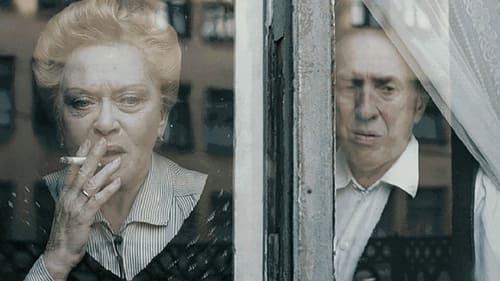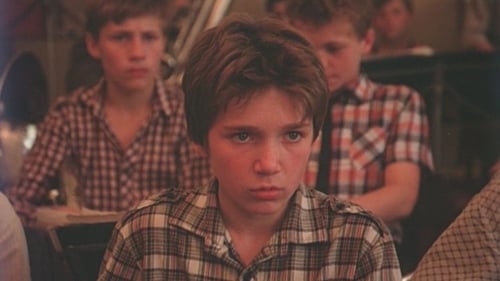Oleg Kovalov
Рождение : 1950-09-20, Leningrad, Russian SFSR, USSR [now St. Petersburg, Russia]

Фильм снят по мотивам сочинений и биографии Иосифа Бродского. Я не хотел бы, чтобы фильм воспринимали как фильм "о Бродском". Это фильм по литературным сочинениям Бродского, по его рисункам, по материалам его биографии, но прежде всего он инспирирован прозой Бродского, которая меня окрылила и вдохновила на эту работу... Я делаю этот фильм с мыслью о том, что он должен быть посвящен памяти наших родителей. Пронзительные строки, написанные Бродским в эссе "Полторы комнаты" и "Меньше единицы" и посвященные родителям, были для меня эмоциональным камертоном. (А. Хржановский).

himself
Поэтический портрет кинорежиссера. Известный режиссер размышляет о творчестве и любви. В фильме участвуют его друзья и соратники: художник Владимир Шинкарев, инженер Владимир Николаев, актриса Елена Крамер (Спиридонова), режиссер, кинокритик Олег Ковалов, режиссеры-некрореалисты Евгений Юфит, Игорь Безруков.

Anton Borisovich
Лихие приключения ВАЗ-2101, «Жигули» первой модели, легендарной «копейки», которая тридцать лет назад была настоящей «богиней» для миллионов советских людей. «Вечная и неразменная», покалеченная, измордованная и реанимированная «золотыми руками» мастера Бубуки, она путешествует от члена политбюро к проститутке, от черноморского каталы к простому гэбэшнику, от предприимчивого пенсионера к физику-диссиденту-лауреату Госпремии из новосибирского Академгородка. Непотопляемый и несгораемый народный автомобиль с ветерком и лязгом катится по дорогам, временам и судьбам, превращается в дом и корабль, в кровать и гроб, очаровывает и вызывает ужас, приносит счастье и губит…

Editor
Mixture of documentary and fiction about the dictatorial 1930s, loosely based on the utopian fantasies of Fritz Lang and about the forbidden passionate love affair between a photographer and his model.

Production Design
Mixture of documentary and fiction about the dictatorial 1930s, loosely based on the utopian fantasies of Fritz Lang and about the forbidden passionate love affair between a photographer and his model.

Writer
Mixture of documentary and fiction about the dictatorial 1930s, loosely based on the utopian fantasies of Fritz Lang and about the forbidden passionate love affair between a photographer and his model.

Director
Mixture of documentary and fiction about the dictatorial 1930s, loosely based on the utopian fantasies of Fritz Lang and about the forbidden passionate love affair between a photographer and his model.

Editor
Eisenstein shot 50 hours of footage on location in Mexico in 1931 and 32 for what would have become ¡Que viva México!, but was not able to finish the film. Following two wildly different reconstruction attempts in 1939 (Marie Seton's 'Time in the Sun') and 1979 (Grigori Alexandrov's '¡Que viva México!') Kovalov has here compiled another hypothetical version of what Eisenstein's film might have been.

Writer
Eisenstein shot 50 hours of footage on location in Mexico in 1931 and 32 for what would have become ¡Que viva México!, but was not able to finish the film. Following two wildly different reconstruction attempts in 1939 (Marie Seton's 'Time in the Sun') and 1979 (Grigori Alexandrov's '¡Que viva México!') Kovalov has here compiled another hypothetical version of what Eisenstein's film might have been.

Director
Eisenstein shot 50 hours of footage on location in Mexico in 1931 and 32 for what would have become ¡Que viva México!, but was not able to finish the film. Following two wildly different reconstruction attempts in 1939 (Marie Seton's 'Time in the Sun') and 1979 (Grigori Alexandrov's '¡Que viva México!') Kovalov has here compiled another hypothetical version of what Eisenstein's film might have been.

Director
A free film adaptation of the director's memoirs. In form, this is the "stream of consciousness" that attracted Sergei Eisenstein after getting acquainted with the experiments of James Joyce. The outer outline of the film is a long foreign trip of the director, which began in 1929, during which he recalls his past life and considers creative ideas. The film is constructed as a free alternation of reality, dreams, and fantasies. The material for it is fragments from the films of Sergei Eisenstein and his fellow contemporaries, documentary footage depicting the director and his time. The wide coverage of the faces and events reflected in the film shows the special role of Sergei Eisenstein in the culture of the twentieth century…

Screenplay
Крыса живёт в клетке, которая стоит в комнате большой коммунальной квартиры, в которой живёт поэт. Квартира находится в доме; Дом - во дворе колодец; Двор находится в городе; А на дворе - 1939 год... В фильме много кадров кинохроники тех времен, звуковой ряд содержит как популярные, так и пропагандистские песни, как советские, так и немецкие. Сюжет разбит на множество не связанных между собой эпизодов, раскрашенных в разные цвета. Автор утверждает, что всё показанное следует понимать вне символики: всё в фильме означает только себя.

Director
Крыса живёт в клетке, которая стоит в комнате большой коммунальной квартиры, в которой живёт поэт. Квартира находится в доме; Дом - во дворе колодец; Двор находится в городе; А на дворе - 1939 год... В фильме много кадров кинохроники тех времен, звуковой ряд содержит как популярные, так и пропагандистские песни, как советские, так и немецкие. Сюжет разбит на множество не связанных между собой эпизодов, раскрашенных в разные цвета. Автор утверждает, что всё показанное следует понимать вне символики: всё в фильме означает только себя.

Producer
The Island of the Dead is a film about the demise of the Russian Epocha Modern. The symbol of this culture was the legendary Russian film star Vera Kholodnaya, who evoked a poetic image of the young urban woman on the silver screen. Her death in 1919, shrouded in tragedy and mystery, put a symbolic end to the pre-Revolutionary period. The Island of the Dead is composed of fragments from numerous films from this period, juxtaposed with other contemporary artistic expressions such as music and painting. Kovalov shows convincingly how the fragile beauty of the Russian Epocha Modern had to make way for the pressure of Futurism, Constructivism and other 'progressive trends', and how these '-isms' were then also relegated to the melting pot to be remoulded by totalitarian norms.

Writer
The Island of the Dead is a film about the demise of the Russian Epocha Modern. The symbol of this culture was the legendary Russian film star Vera Kholodnaya, who evoked a poetic image of the young urban woman on the silver screen. Her death in 1919, shrouded in tragedy and mystery, put a symbolic end to the pre-Revolutionary period. The Island of the Dead is composed of fragments from numerous films from this period, juxtaposed with other contemporary artistic expressions such as music and painting. Kovalov shows convincingly how the fragile beauty of the Russian Epocha Modern had to make way for the pressure of Futurism, Constructivism and other 'progressive trends', and how these '-isms' were then also relegated to the melting pot to be remoulded by totalitarian norms.

Director
The Island of the Dead is a film about the demise of the Russian Epocha Modern. The symbol of this culture was the legendary Russian film star Vera Kholodnaya, who evoked a poetic image of the young urban woman on the silver screen. Her death in 1919, shrouded in tragedy and mystery, put a symbolic end to the pre-Revolutionary period. The Island of the Dead is composed of fragments from numerous films from this period, juxtaposed with other contemporary artistic expressions such as music and painting. Kovalov shows convincingly how the fragile beauty of the Russian Epocha Modern had to make way for the pressure of Futurism, Constructivism and other 'progressive trends', and how these '-isms' were then also relegated to the melting pot to be remoulded by totalitarian norms.

Director
A mixture of shots form a Soviet propaganda film and a documentary about the clinic for incurable alcoholics.

Телережиссер Павел Пришвин снимается у своего друга-кинорежиссера, фильм которого рассказывает о сталинизме. Павел играет капитана органов госбезопасности, ведущего одно из многочисленных дел. Фильм создается в высшей степени конъюнктурный. Павел понимает это, поскольку на телевидении он работает с документами сорокалетней давности, знакомится с людьми, о которых готовит передачу, посвященную пионерам телерадиовещания.

Братья, старший Костя и младший Семён, вместе с отцом-одиночкой проживают в маленькой коммунальной квартире, иногда появляется «подруга» отца. Костя увлекается рок-музыкой, которая является для него образом жизни, как и для немалой части молодежи того времени. Отец уделяет мало времени сыновьям, и между братьями вырастает настоящая дружба. И когда Костя попадает в очень сложную ситуацию, его брат идет на всё, чтобы помочь ему…


















